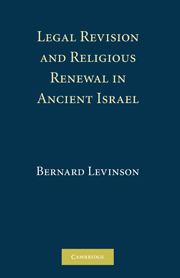Book contents
- Frontmatter
- Contents
- List of Figures
- Foreword, by Jean Louis Ska
- Preface
- Abbreviations
- 1 Biblical Studies as the Meeting Point of the Humanities
- 2 Rethinking the Relation between “Canon” and “Exegesis”
- 3 The Problem of Innovation within the Formative Canon
- 4 The Reworking of the Principle of Transgenerational Punishment: Four Case Studies
- 5 The Canon as Sponsor of Innovation
- 6 The Phenomenon of Rewriting within the Hebrew Bible: A Bibliographic Essay on Inner-Biblical Exegesis in the History of Scholarship
- Author Index
- Subject Index
- Index of Scriptural and Other Sources
3 - The Problem of Innovation within the Formative Canon
Published online by Cambridge University Press: 18 August 2009
- Frontmatter
- Contents
- List of Figures
- Foreword, by Jean Louis Ska
- Preface
- Abbreviations
- 1 Biblical Studies as the Meeting Point of the Humanities
- 2 Rethinking the Relation between “Canon” and “Exegesis”
- 3 The Problem of Innovation within the Formative Canon
- 4 The Reworking of the Principle of Transgenerational Punishment: Four Case Studies
- 5 The Canon as Sponsor of Innovation
- 6 The Phenomenon of Rewriting within the Hebrew Bible: A Bibliographic Essay on Inner-Biblical Exegesis in the History of Scholarship
- Author Index
- Subject Index
- Index of Scriptural and Other Sources
Summary
The concept of divine revelation of law distinguishes Israelite religion from all of the other religions of the ancient Near East. According to this concept, Yahweh publicly reveals his will to Israel in the form of cultic, civil, and ethical law, obedience to which becomes the condition for the nation's proper relationship to God and possession of the promised land of Canaan. The most dramatic account of this legal revelation occurs when God, from the top of Mount Sinai, proclaims the Ten Commandments to the nation of Israel gathered at the base of the mountain, trembling in fear of the thunderous divine voice (Exod 19–20). But it is not the Ten Commandments alone that the Hebrew Bible ascribes to divine revelation. By means of a redactional tour de force, the entire legal corpus of the Pentateuch, in effect all biblical law, is either attributed directly to God or indirectly to him through Moses, his prophetic intermediary.
THE LEGACY OF CUNEIFORM LAW
Despite the claim by Israelite authors for the divine origin of the legal collections, the archaeological remains of the ancient Near East preclude any notion of lex ex nihilo. The Near East bequeathed to ancient Israel a prestigious literary genre, the legal collection, that originated in the scribal schools (the e d u b a) of late-third-millennium Sumer and then spread up the Fertile Crescent through Babylon and Assyria into Anatolia and the Hittite Empire.
- Type
- Chapter
- Information
- Legal Revision and Religious Renewal in Ancient Israel , pp. 22 - 56Publisher: Cambridge University PressPrint publication year: 2008



